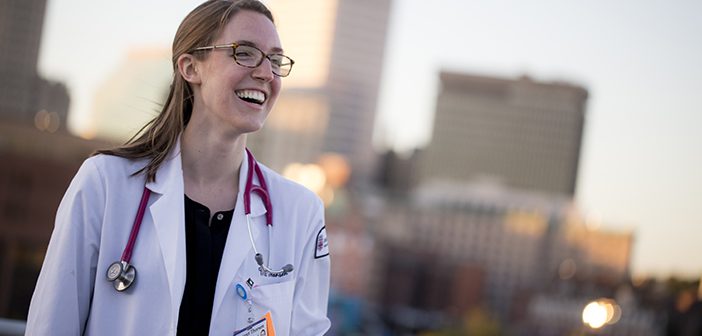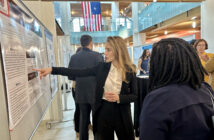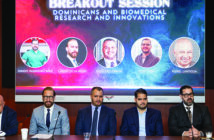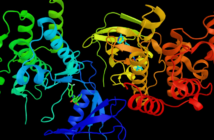A Cumberland native wants to use her medical degree to make Rhode Island a better, healthier place.
To gain a patient’s trust, it helps to speak their language. Margie Thorsen ’15 MD’19 doesn’t know much Spanish, but when a Spanish-speaking patient told a physician that they got primary care at a clinic near “el castillo en Cranston,” Thorsen was able to step in and translate.
“[The doctor] was fluent in Spanish,” says Thorsen, who grew up in Cumberland, “but she didn’t speak Rhode Island. When the patient said ‘near the castle in Cranston,’ I knew they meant the [Providence Community Health Center] near the Armory on Cranston Street.”
Whether it’s knowing the local landmarks, or the local quirks—Thorsen gets that for a patient in Providence, Woonsocket is so far away it might as well be the moon—her status as a native has been nearly as indispensable to her as her medical training as she negotiates the long journey to becoming a doctor. “I love having very Rhode Island conversations with people—bonding with patients about the state and the community,” she says.
Thorsen’s connection to her community is an important piece of her holistic approach to medical education. She’s learning to treat not just individual patients but whole populations, and simultaneously to educate and encourage the next generation of students to follow in her footsteps.
“She’s a great role model and mentor,” says Julianne Ip ’75 MD’78 RES’81, an associate dean of medicine. “I think she’s going to be a phenomenal physician.”
Big-Picture Medicine
Thorsen is tall and athletic, with long, light-brown hair and a welcoming smile. In blue scrubs and a white coat, she looks right at home at Women & Infants Hospital, where she was completing a clinical rotation last fall. It turns out her mother is a nurse in the neonatal intensive care unit there. “She’s a huge inspiration to me,” Thorsen says.
She loved science, and wanted a career where she could help people and work on a team. Then an injury she sustained as a track and field athlete at La Salle Academy pointed her toward medical school. “I was inspired by the way [my doctors]interacted with me and cared for me,” she says.
Thorsen was accepted to Brown’s eight-year Program in Liberal Medical Education (PLME), which guarantees admission to the Warren Alpert Medical School. As an undergraduate she studied public health. It changed her notion of what a physician can be: someone who, in addition to caring and advocating for her patients, can think in a big-picture way about the communities they live in, the policies that affect them, and their health outcomes as a group.
“The public health I can do outside of clinical practice I’m really excited about: population health, health equity,” she says. “I didn’t know about these things in high school that excite and invigorate me now.”
Ip, who is dean of the PLME, hired Thorsen as a teaching assistant for her PLME senior seminar. “She was a leader. People are naturally drawn to her,” Ip says. Thorsen showed an early interest in service and social justice, Ip adds, as an intern for the state Department of Children, Youth, and Families, an undergraduate peer adviser, and a tutor to refugee children. “Margie was always committed to helping and being an advocate for patients,” she says.
As a sophomore Thorsen began working with Megan Ranney, MD RES’08 F’10 MPH’10, an associate professor of emergency medicine, on a study of a text-messaging tool for teens at risk for depression. “She just clearly had the maturity and the passion and the work ethic,” Ranney says. And she worked well with teenagers: “Margie is warm, empathetic, understanding—she has an instant rapport and ability to make study participants feel comfortable.”
That work introduced Thorsen to the world of digital health technologies and big data, which informed her public health studies as an undergrad and continue to influence her medical education. She’s pursuing a scholarly concentration in biomedical informatics, for which she’s digging into data from CurrentCare, Rhode Island’s health information exchange, to compare it to the state’s general patient population.
“I want to find out if we can use CurrentCare [data]to answer large research questions, like the prevalence of different diseases, and how certain demographics interact with certain diagnoses or prognoses,” Thorsen says. She admits she’s struggling with the coding, but fortunately that’s a strength of her research partner, Rajsavi Anand MD’20. “Working on a team brings out the best in me,” she says.
Ranney is also advising her on the project. “We’ve worked together for so long,” Ranney says, “lucky enough for me.” She adds: “Our way of approaching projects and the world is similar. We’re both motivated by a social justice take on things.”
Thorsen wants to pursue a specialty that will allow her to advocate for her patients and to treat them long term. So she was surprised how much she loved her clinical rotation in surgery—on the trauma ward in particular, where some seriously injured people, who’ve suffered burns or vehicular wrecks, may stay for weeks or months. “It would be really fulfilling to take care of patients like that, all the medical management and surgical management, plus you can work in injury prevention and violence prevention, so it has a public health component,” she says.
That’s not to say she’s decided, though; she also loved pediatrics and ob/gyn, and she hasn’t completed all her clinical rotations yet. Fortunately she won’t have to choose a specialty until this fall. “Margie engages with everybody, the patients and the staff and the attendings—everybody and everything is interesting to her,” Ip says. “I’ll be fascinated to see what she decides to do.”
True to Her Roots
Even as a busy medical student Thorsen finds time to connect with fellow Rhode Islanders. She has mentored local high school students who are interested in health care careers, helped establish a scholarship program so they can take summer courses at Brown, and even taught a hands-on medicine class. “It was fun to tell them I’m from Cumberland,” she says.
In her precious free time Thorsen rides her unicycle, sails with her grandpa, and hangs out with her family (and their dog) in Cumberland, and her fiancé, Yao Liu ’15 MD’19. “I want to be around the people I love,” she says. Next year she and Liu will apply to residency programs as a couple, and they hope they won’t have to go far.
“I’m realizing what it means to be a Rhode Islander,” Thorsen says. For six years she’s been tutoring the children of a refugee family from Eritrea; she calls them her “second family.” She coordinated the program in 2014, meeting families as they arrived and connecting them with tutors.
“It was really emotional, to be a Rhode Islander and introduce them to the state and see Rhode Island become a home to them,” she says. “It’s really joyous to see how the community here is so welcoming to people from all over the place. Regardless of where my residency is, this will always be my home.”




